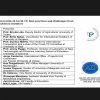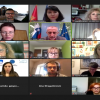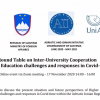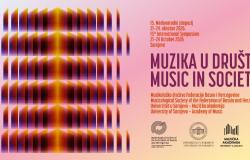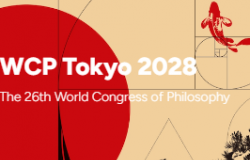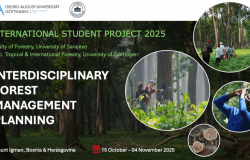UNIADRION Roundtable on the Impact of COVID19 on Student Mobility Held

On 17 November 2020, the international organization UniAdrion General Secretariat in cooperation with the UniAdrion presidency (University of Primorska) organized an online Zoom round table on interuniversity cooperation “Challenges and Answers of Higher Education in the Time of Covid19.” The aim was to present the experiences of UniAdrion members in response to the pandemic.
The international mobility analysis in the coronavirus period was presented at the meeting, as well as the experiences of the involved universities. The emphasis was on establishing flexible crisis management at each institution that will be able to offer support and activities before, during and after the pandemic. The goal is to identify weaknesses and areas for improvement, as well as rebuild the brand and reputation of mobility.
It was mentioned that universities should further exchange ideas on these common challenges, sharing good practices and solutions, and creating common environments for online lectures and exchange of experiences, both of teaching and non-teaching staff and students themselves.
The “new normal” state created by Covid19 has given us new opportunities for education and cross-border cooperation through the use of technology that we have not researched much before. This is a chance to re-launch and re-shape academic mobility to be more inclusive and sustainable.
As one of the examples of the response to the pandemic, the Norwegian Ministry of Education was mentioned, which, in response to their crisis management, adopted the so-called “White Paper for Student Mobility” which places more emphasis on mobility as mandatory, with a focus on virtual mobility and the inclusion of the possibility that it can last 1 to 3 months (compared to the previous minimum of 3 months).
UniAdrion conducted a study, emphasizing that the biggest effect of Covid19 on education was the transition to “distance-learning,” as well as the closure of universities and the inability to physically attend classes. Online teaching tools were used by only 9.2% of the surveyed universities before the pandemic, but after the pandemic expansion and spread of the virus, and the measures taken, the use of online tools increased to 33.3%. Most mobility was delayed, while a smaller number were canceled or resumed in a different environment (online teaching).
University of Sarajevo Vice Rector for International Cooperation Prof. Dr. Enita Nakaš presented the experience of the University of Sarajevo during the coronary virus pandemic, where the transition to the so-called hybrid classes, a combination of less physical and more online classes in the expectation that they will return to normal in the fall. The problems are due to difficulties with technological support, caused by insufficient internet speed in Sarajevo, which is crucial for monitoring online classes, organizing final exams and the fact that “returning to normal higher education” in the fall will not be so easy due to new waves of coronavirus. Vice-Rector mentioned that one of the biggest victims of Covid19 (when it comes to higher education) is certainly mobility, internationalization and research. When it comes to social responsibility, the fact is that the greatest focus is given to health and testing for the virus, however the stress that arises due to the impossibility of normal monitoring and teaching is underestimated and neglected. The need to conduct frequent surveys on stress among students, teaching and non-teaching staff of higher education institutions was emphasized in order to monitor and adequately respond to the well-being of their condition.
UniAdrion is an association of universities and research centers of the Adriatic-Ionian region, founded in 2000 with the aim of creating a lasting connection between these institutions, within the Adriatic-Ionian Initiative. The purpose of UniAdrion is cooperation between universities and research centers with the aim of strengthening international cooperation and favoring the progress of culture, science, education and research in the countries of the Adriatic-Ionian Basin. The association has about 40 members located in the following countries: Albania, Bosnia and Herzegovina, Croatia, Greece, Italy, Montenegro, Serbia, and Slovenia.





